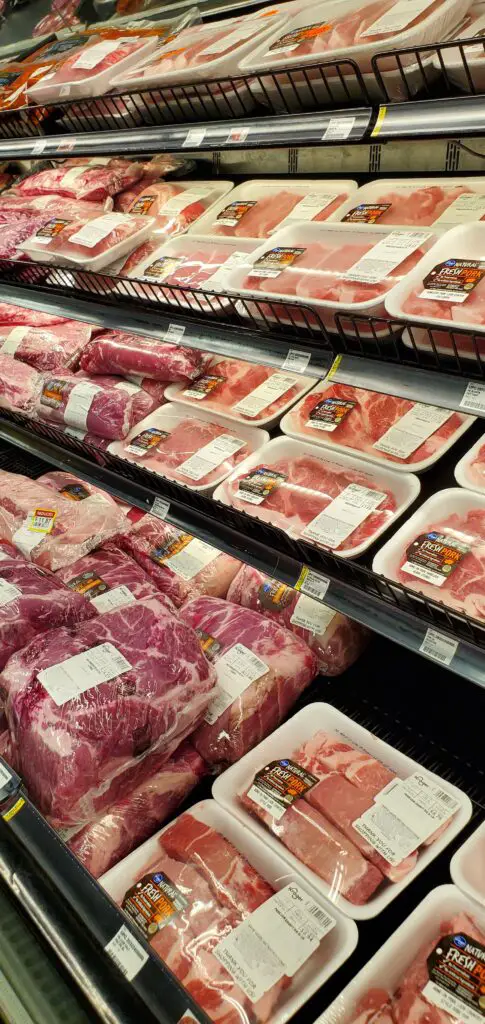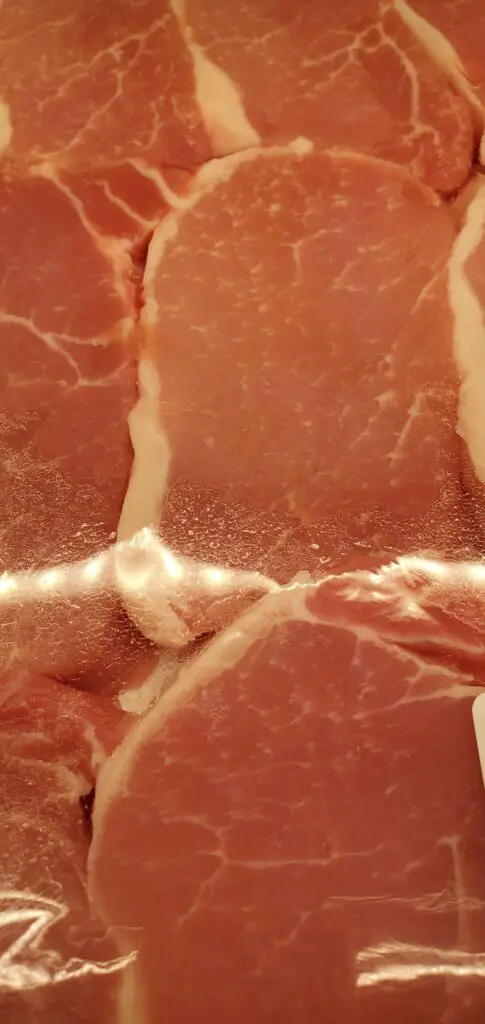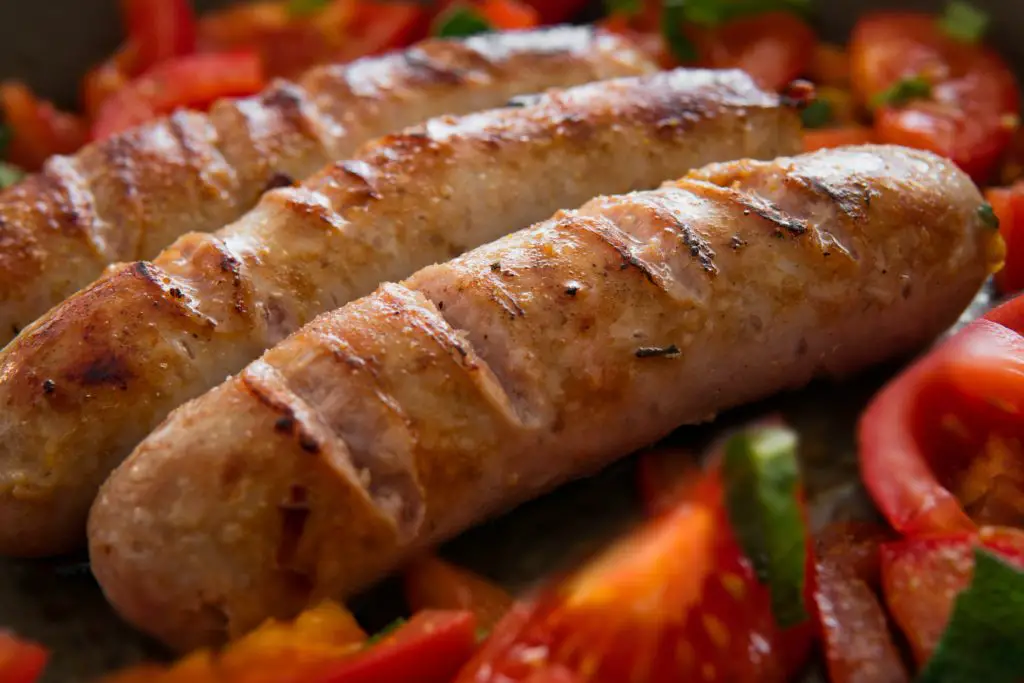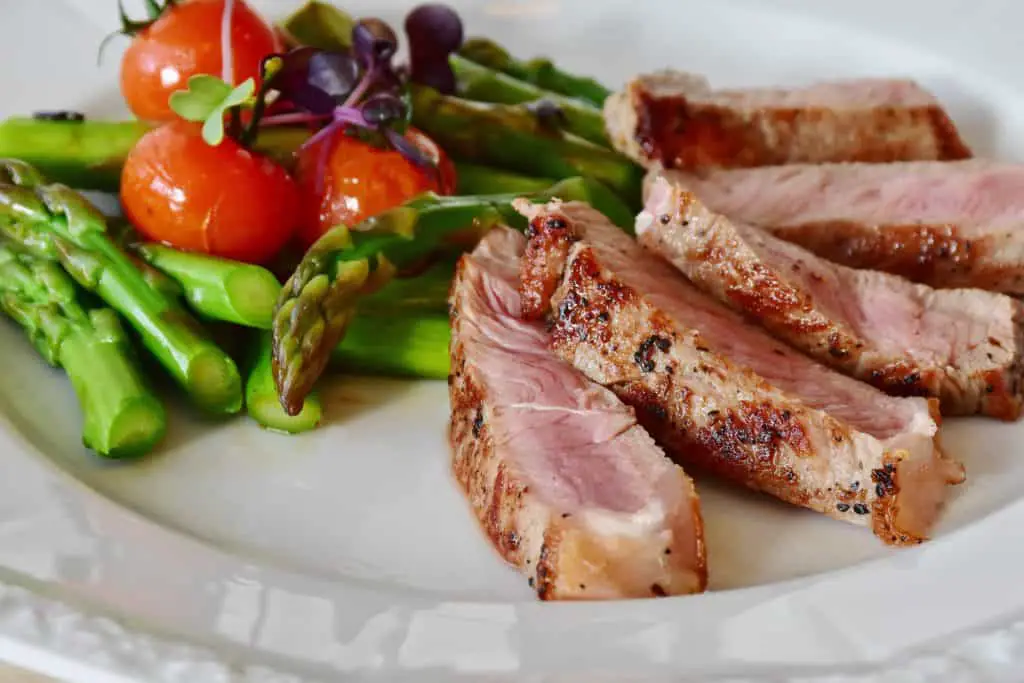A dog’s diet is mostly comprised of meat, typically beef, chicken, or turkey. One often asked question by dog owners is what about the other white meat, can dogs eat pork? The answer to that question, is not as clear-cut as some foods that you may give to your dog.
Plain pork is not toxic or poisonous to dogs. Can dogs eat pork? It really depends on the type of pork, specifically how it was raised and prepared. As with most meat, the living conditions and food the animal was raised on effects the quality of nutrients offered in that meat.
In this article, Can Dogs Eat Pork, you will learn about the unique nutrients found in pork, the potential dangers of feeding pork to dogs, and why the nutrients vary in pork that is sold at the market.
- Nutritional Value of Pork for Canines
- Best Way to Serve Pork
- Potential Dangers of Feeding Pork to Dogs
- Pastured Raised Pigs versus Factory Farmed Pigs
- Alternatives to Pork
Pork that was farm raised and served plain to your dog can have nutritional value. Plain pork means the pork does not contain added preservatives, flavorings, seasonings, and sugars. The protein content of lean pork (cooked) is approximately 26%.
Related Articles:
- A Review of the Top 5 Best Brooms For Dog Hair
- A Review of the 5 Best Peanut Butters for Dogs
- A Review of the 4 Best Dog Shampoos for Itchy Skin
Can dogs eat pork? Health Benefits Found in Pork
- Easy protein source to digest
- Contains vitamin E: necessary for strong immunity, stabilizes cell membranes, supports healthy heart, liver, muscles, nerve cells and skin.
- Less allergic for dogs
- Excellent source of amino acids – necessary for growth and overall health
- Rich source of high protein
- High in B1 (thiamine): essential for cell function, coverts food into energy.
- Source of omega 3: necessary for healthy skin, coat, and joint health.
- The conditions in which the domestic pigs are raised directly effects the quality and availability of nutrients found in pork.
Related Articles:
Can dogs eat pork? Best Way to Serve Pork
Can dogs eat pork? Dogs can benefit from certain types of pork in their diet. Pork purchased from a local farmer that pasture-raised their pigs will have the healthiest pork. Plain lean pork (with fat trimmings cut off) can be beneficial to your dog.
Cook the lean pork before giving it to your dog. Cool. Serve as a treat, an extra protein food topper or mix it with other vegetables and organ meat for a complete meal.
Feeding your dog quality pork can be a healthy option, however, take the necessary precautions before purchasing pork.

Related Articles:
- Ultimate Guide: How To Take Care Of A Puppy
- Ultimate Guide: How To Take Care Of A Dog
- Ultimate Guide: How To Take Care Of A Senior Dog
- The Benefits of Owning a Dog
- Top 12 Tips for First Time Dog Owners
Can dogs eat pork? Potential Dangers of Feeding Pork to Dogs
Commercial dog food companies usually shy away from using pork as their main protein source for many reasons, one being the availability of quality raised pigs.
Processed Pork. This is the most common way humans serve pork. Pork is processed or cured to make sausage, bacon, ham, and other flavorful pork products. Ham in particular has a high fat content which can cause excessive thirst and bloat in dogs.
Unfortunately, processed pork is found to be high in fat, preservatives, and sodium. Humans like to add seasonings that are toxic to dogs, such as onion powder and nutmeg. Barbecue sauce is another product commonly added to pork that is off limits to canines.
Imbalance of Fatty Acids. Due to the pig’s diet, pork is drastically off with balancing fatty acids. Commercially sold pork is high in omega-6 and low in omega-3. A diet high in omega 6 fatty acids leads to too much inflammation. Symptoms such as arthritis and joint issues show up in dogs.
Related Articles:
- How to Cook Marrow Bones for Dogs
- A Review Of The Top Five Best Foods for Hiding Dog Pills In
- A Review of the Top 5 Best Dog Bones For Aggressive Chewers
- A Review Of The Top 5 Best Bone Broths for Dogs
- A Review Of The Top 5 Best Dog Whistles
Parasites. Raw pork carries the parasite trichinella spiralis larvae. This parasite can cause what is called a “parasite infection.” If your dog has consumed raw pork, know the symptoms of this infection. Symptoms include lethargy, upset stomach, diarrhea, vomiting, elevated fever, pain, and stiffness. Call your veterinarian right away if your dog is experiencing these symptoms.
Freezing the pork for at least three weeks before consuming can kill the parasites.
No Bones. Dogs love to chew a tasty a bone, but what about pork bones? Pork bones, both raw and cooked, can splinter easily. Cooked bones become brittle and leave sharp pieces for your dog. It can cause damage to the dog’s esophagus and intestinal blockages. Pork bones are just small enough that large dogs have tried to swallow them whole, which is a potential choking hazard.
The best use for raw pork bones is to make them into a tasty broth for your dog. If your dog does swallow a pork bone, monitor your dog until the bones pass or call your veterinarian.
High in Fat. Pigs are known to be rich in fat. This fat is difficult for a dog’s digestion to breakdown into energy. Excess fat could lead to indigestion and inflammation of the pancreas. Trim off any fat before cooking and serving it to your dog.
Quality pork can be found in your local farming community. Farmers markets and local meat markets are good resources. Know the difference between pasture raised pigs and factory farmed pigs.

Related Articles:
- The Best Canned Dog Food for Dogs with Sensitive Stomachs
- A Review Of The Top 5 Best Tactical Dog Harnesses
- How to Build an Outdoor Dog Potty Area on Concrete
- A Review of the 5 Best Dog Muzzles
- A Review Of The Top 5 Best Dog Clickers
Can dogs eat pork? Pastured Raised Pigs versus Factory Farmed Pigs
According to MSPCA.org, 105 million pigs are raised on factory farms, providing the United States with 97% of their pork supply.
Can dogs eat pork? Quality farm-raised pork is safe for dogs to consume; however, it is not as easily found in supermarkets.
Pasture Raised Pigs: Pigs that are raised with room to roam and forage produce the best quality meat. Pigs forage for roots, plants, bugs, and nuts. Pigs that have access to fresh air and sunshine are healthier, therefore, their meat is healthier.
Heritage pig breeds are traditional livestock pigs raised by locally owned farms. Six common heritage breed pigs are Magnalitsa, Red Wattles, Tamworth, Large Black, Gloucestershire Old Spot, and Hampshire.
These pigs are humanely raised and known to have the most flavorful meat.
Pasture raised pigs forage on roots, grass, grubs, weeds, garden vegetables, and fruit. One additional benefit is they get natural soil-based probiotics from foraging.
Related Articles:
Factory Farmed Pigs: These pigs are weaned around three to four weeks of age and mature in a confined building. They only know concrete floors and never touch soil or get natural sunshine. Factory farmed pigs are more vulnerable to illness, requiring regular doses of antibiotics and dewormers.
Factory farmed pigs diet consists primarily of processed corn and soymeal. Corn is for energy and the soy is for protein. The manure produced from this type of diet is harmful to the soil, killing off soil organisms and healthy beetles.
When you compare the nutrient quality of the pork, pasture raised pigs produce healthier meat. It has less fat and more nutrition. Pasture raised pig meat contains more antioxidants like selenium, which is aids in fighting off free radicals in the body.
One bonus of feeding your dog pasture raised pigs, is the quality of organ meat. Pork liver from pasture raised pigs contains a concentrated amount of vitamins, especially B vitamins. The trachea is a great source of glucosamine and chondroitin which is necessary for healthy hips and joints. The trachea can be roasted in the oven at low temperatures.
Related Articles:
- A Review Of The Top 5 Best Carpet Cleaner Solutions for Dog Urine
- A Review Of The Top Best Silent Dog Whistles
- A Review Of the Top 5 Best Artificial Grasses For Dog Potty

Alternatives to Pork
When quality pork is not available, shop for other nutritious proteins such as free-range and grass-fed beef or chicken. The taste of plain meat is delicious to a dog, so avoid using any seasonings or added flavorings.
Can dogs eat pork? Yes, dogs can benefit from plain cooked pork, with the fat trimmed off. The higher the quality of meat, the more nutrients and essential amino acids are available to the dog. Pork has an impressive amount of thiamine and protein content.
The bottom line for choosing to serve pork to your dog is to purchase from your local farmers. Locally grown pork purchased from local farmers is going to be higher in nutrition. Farmers allow their pigs to forage therefore you know that you are serving a tasty protein to your dog.
Please read our Legal Disclaimer


